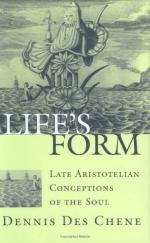|
This section contains 1,504 words (approx. 6 pages at 300 words per page) |

|
Conceptions of the Soul
Summary: A comparison between Plato and Aristotle's conceptions of the soul, their methods of presentation and its plausibility.
Plato (in Phaedo) and Aristotle (in De Anima) present two fundamentally different conceptions of the soul. Through an analysis of their frameworks and genre, and whether their methods are plausible, it can be concluded that Aristotle's formulation of the soul is more compelling than that of Plato.
According to Plato, the body and the soul are separate entities. The soul is capable of existing before life of the body and after death of the body and it is constant, unchanging and non-physical (invisible). The soul resembles what is divine, immortal, and always remaining true to itself. The body, however, resembles what is human, mortal, and destructible. The body is changing and never able to maintain its true identity (Plato, 80b). Due to this radical difference between body and soul, their relationship is can be described as antagonistic. In Phaedo, Plato says that body always hinders the soul from...
|
This section contains 1,504 words (approx. 6 pages at 300 words per page) |

|


